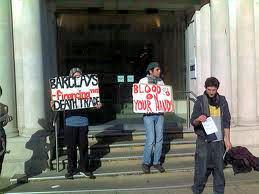
British Quakers were united in their opposition to apartheid. The
Anti-Apartheid Movement campaigned vigorously to boycott Barclays Bank,
which had banked for London Yearly Meeting for many years. This aspect
of the campaign divided both British and South African Friends. Successive
letters in The Friend urged readers to seek that of God in both Piet Botha
and Margaret Thatcher, and to eschew the use of economic pressure against
South Africa. Others, urged on by Young Friends, pressed for a Quaker
boycott of Barclays and of South Africa.
Meeting for Sufferings temporized,
clearly reluctant to condemn the Quaker bank with which they had long worked
happily. Eventually they yielded to pressure, transferring their funds from
Barclays to the Cooperative Bank. The decision seems to have been taken
discretely. The writer has been unable to trace any mention of it either
in The Friend or in Meeting for Sufferings reports to Yearly Meetings.